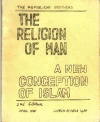A different conception of Islam
Islam has historically been unjustifiably criticized by both misinformed non-Muslims and equally ill-informed self-proclaimed progressive Muslims. Nevertheless, the religious leaders, who profess to have devoted their lives to the preservation of Islam, currently stand at a loss as to how to fulfill their sacred commitment. Non-Muslims might be excused for their relentless attacks upon Islam because the traditional Muslim religious leaders, preoccupied with trivialities and dogma, have lost their ability to generate conviction in the minds of contemporary believers. However, Islam is still capable of being as dynamic and indisputable a doctrine today as it was when it was introduced, some fourteen hundred years ago.
Nowadays, there exist a multitude of ideologies which rival and even threaten to eradicate Islam. These flourishing and apparently convincing ideologies not only endanger Islam, but actually pose a general threat to all the spiritual values humanity has endorsed up until the present time. The magnitude of this threat must not be underestimated, for it has the ability to both, completely raze the already dilapidated “pillars of Islam”, as well as prevent any attempt at their restoration.
Fortunately, Islam is capable of responding to the challenge, as will be briefly outlined in this booklet, and it shall do so as the rightful and legitimate heir of all human religions and spiritual heritage. But there is a major obstacle blocking the path towards the proclamation of this altogether new level of Islam. This is the persistence of traditional Muslims to misrepresent Islam as a mere faith, primarily concerned with developing strong emotions and blind belief, instead of promoting a broad and tolerant critical intellect and righteous conduct. So long as Islam is presented as narrow and exclusive faith, it shall only succeed in provoking the narrowness and exclusiveness of other faiths and religions.
The primary architects of this massive obstacle are the Islamic Scholars who have wasted away their lives, studying religious dogma, and their energy in complicating religion to the point that it requires years of specialized higher education before one is even qualified to put on the “pretentious piety”.
Surely, Islam has lost nothing of its capacity to guide and persuade, but in fact the pseudo-religious leaders of today have proven to be misguided and incapacitated by virtue of their very ignorance of the transcendent human potentialities embodied in Islamic doctrine. These ignorant “scholars” are, thus, incapable of meeting the challenge of defending, let alone applying Islam in these troubled times. They are unable to comprehend the idea that this is a universal age in need of a universal ideology, not unenlightened, national, theories or primitive indigenous creed. The time in which humanity could be satisfied by blind faith with the guarantee of heavenly reward for time spent in holy belief on earth, has long since pasted. The contemporary individual has grown more critical and practical, evaluating things more and more on the basis of the rational assessment of their validity and ability to satisfy the material needs of his daily life. Therefore, fallacious and unscientific beliefs, lacking practical values, will have no place in this contemporary world.
The old fashioned presentation of Islam, as a rigid creed above and beyond criticism, will be categorically rejected by an increasingly critical modern mentality. The way to the hearts of modern individuals is through their minds. Hence the popular understanding of Islam handed down through centuries of pretentious performance and rhetoric of the “religious scholars” is simply not convincing to the modern minds, and as such irrelevant. This understanding, however, is not the whole of Islam. It is merely a stage, or a version that was convincing and relevant to a time and place different from our own. When we dismiss the abortive and frustrating intermediation of the “religious scholars” and address ourselves to the original sources in an intelligent, rational and disciplined manner, we shall discover the continuing credibility and relevance of Islam which addresses the modern age in its own language, and convinces the modern man by satisfying all his material and spiritual needs.
Without revealing, proclaiming and implementing this progressive and scientific phase of Islam, Muslims can not hope to convince this modern, tremendously technologically advanced no-Islamic world of today to embrace Islam. Even Muslims themselves, specially the so-called “religious scholars”, are unable to practice what they preach. This is because, as will be shown below, what they preach, namely, Sharia law, is today outdated and irrelevant. It was never intended for the world of today.
It must be emphasized, however, that we are not advocating the abandonment of Sharia law except as an essential step in the implementation of true Islamic law. In other words, we maintain that the irrelevance of an outdated Sharia law must be recognized in order to pave the way for the evolution of relevant and contemporary Sharia law.
So far, we have defined our conception of Islam in negative sense, that is to say, by indicating what we do not wish to implement. The reader may, therefore, wish to know of the actual content of what we claim to be the scientific and relevant phase of Islam which he is invited to consider. The reader may also query the process or method of evolving this so-called scientific and yet Islamic ideology. It may be relevant and scientific, and it may succeed in solving all our problems and satisfying all of our needs, but is it still also Islamic?
We shall now take these two questions in turn, and the content of this new conception of Islam, and the methods or techniques by which it is derived from the original Islamic sources.

